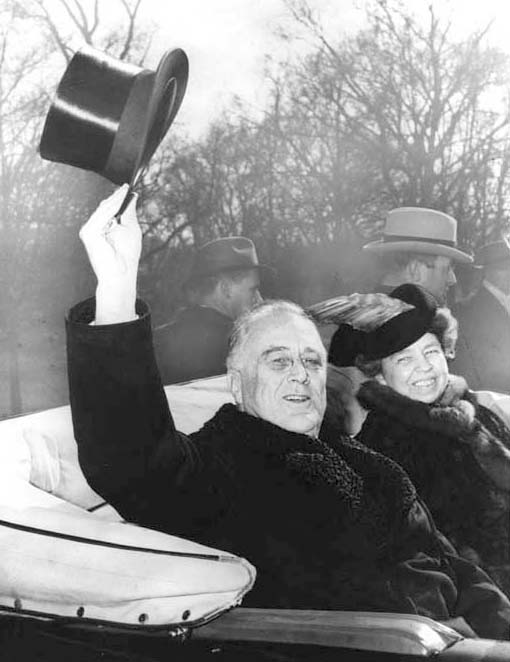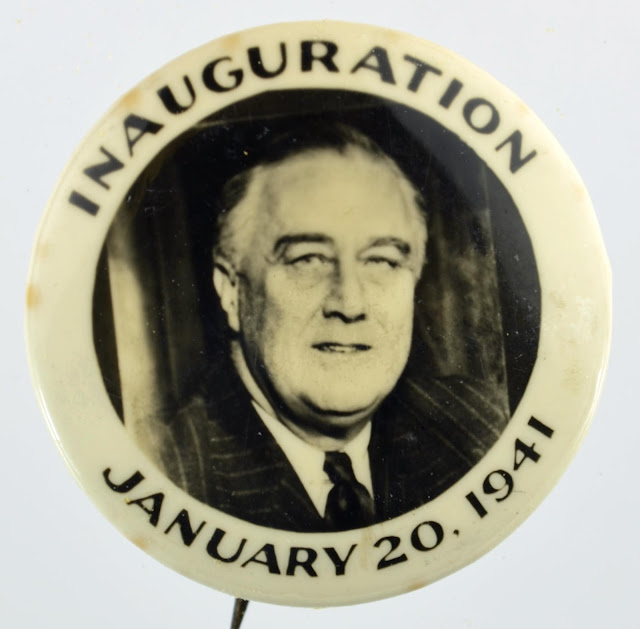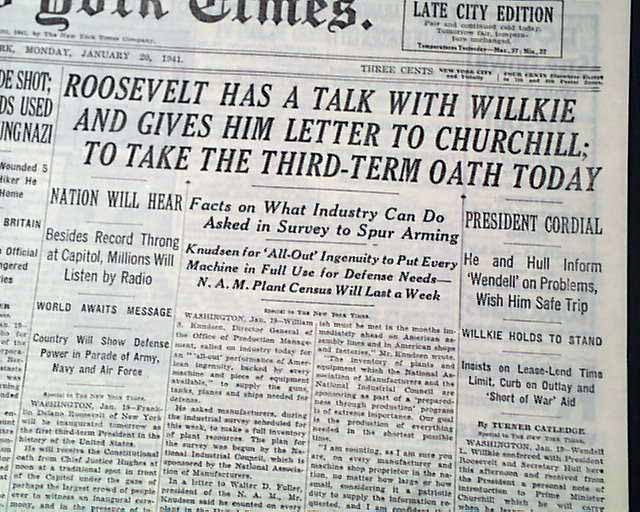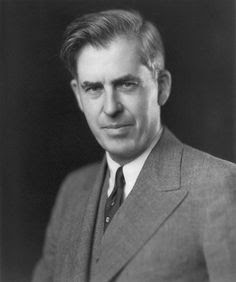Wednesday 29 January 1941
Metaxas remains a very divisive figure in Greece to this day. He also was a man of many contradictions, as he was fervently pro-German during World War I and later came to fear them. Some deplore his authoritarian style and dictatorial policies, while others remember him as a populist who always put Greece and the Greek people first. One thing is for certain: he left Greece in a much better military posture than anyone thought possible. Not only is the Greek army shoving the Italians all over Albania, he also gives the Greek state at least a chance of holding off the Germans along the Bulgarian border with his chain of fortifications known as the Metaxas Line.
On the Trebeshina mountain range, the Greeks turn the tables on the two Italian Blackshirt battalions who took the peaks recently. The Cretan 5th Division of III Corps launches its own attack to recapture the key area that has changed hands several times. However, the Blackshirt battalions defend strongly.
East African Campaign: The British offensive against Italian possessions in East Africa expands today. The South Africans enter Italian Somaliland from Kenya with the 1st South African, 11th and 12 African (local) Divisions. General Wavell remains in Nairobi watching over developments.
Major-General Noel Beresford-Peirse's British 4th Indian Division ends a fake diversionary attack it has been staging against Mount Itaberrè and Mount Caianac, north of Agordat. It also fails to capture Mount Laquatat, which it really does want to take. These are rare failures for the advancing British forces, which otherwise have had little opposition on their advance into Italian East Africa. Beresford-Pierse sends the 1st Battalion of the 6th Rajputana Rifles Regiment to take Mount Cochen, which it does. The Italian troops in the sector, however, are in good fighting form and make plans to try to retake the mountain.
European Air Operations: RAF Bomber Command continues its persistent and fruitless attacks on the German battleship Tirpitz at Wilhelmshaven. It sends 25 Wellingtons to attack it, to no effect. If ever there were a warship that earned its keep by simply remaining afloat as a persistent target, it is the Tirpitz.
After an extended period (ten nights) without major air attacks, the Luftwaffe ramps back up slowly, sending 36 bombers against London. Many Londoners, feeling a false sense of security due to the lack of recent raids, have gone back to sleeping at home. This raid sends many back to the shelters and tubes.
 |
| Kids wearing Zoot Suits in Chicago, Chicago, 1941 (Library of Congress). |
After dark, the Kormoran crew sights another ship and shells it. This ship, unlike the Afric Star, gets off a distress call that the Kormoran can't jam. Once again the Kormoran crew boards, and, helped by the codebooks taken earlier in the day from the Afric Star, identifies the ship as the 5273-ton British freighter Eurolychus. It is carrying bombers for Ghana (the Gold Coast). Detmers sinks this ship with a torpedo as well and takes four British and 39 Chinese crew prisoners (there are 10 deaths and 28 survivors are picked up later by a passing Spanish freighter). Detmers has to leave the scene quickly because, responding to the distress calls, HMS Norfolk and Devonshire show up. One of the men who is rescued by the Spanish ship, Frank Laskier, later becomes a propaganda hero for the merchant marine. Fortunately for the Kormoran, it outruns the Royal Navy ships in the darkness.
U-93 (Kptlt. Claus Korth), operating in the Northwest Approaches, has a big day. It sinks 4929 ton Greek freighter Aikatern, 5886-ton British freighter King Robert, and 10,468-ton British tanker W.B. Walker. All three ships are part of Convoy SC 19. Everybody on King Robert and Aikatern survives, while four men perish on the Walker.
U-94 (Kptlt. Herbert Kuppisch) is operating in the same general area as U-93. It torpedoes and sinks 4353-ton British freighter West Wales. West Wales is a straggler from Convoy SC 19. There are 16 deaths and 21 survivors, rescued by the convoy escorts HMS Antelope and Anthony.
U-106 (Kptlt. Jürgen Oesten), on its first patrol out of Kiel (heading for Lorient), torpedoes and sinks 2962 ton Egyptian freighter Sesostris. Everybody perishes.
British 8967 ton transport Westmoreland hits a mine in the Thames Estuary and is abandoned by its crew. A prize crew boards and takes it to Liverpool.
German battlecruisers Scharnhorst and Gneisenau continue heading northeast toward a rendezvous with an oil tanker. The weather remains very rough, and the German ships are beyond the range of RAF reconnaissance, so they proceed unmolested.
Convoy FN 395 departs from Southend, Convoy FS 399 departs from Methil.
The Germans continue laying defensive minefields off Norway.
Royal Navy minesweeper HMS Ilfracombe and antisubmarine warfare trawler HMT Polka are launched.
Submarine USS Marlin is launched, the destroyer USS Bailey is laid down.
U-152 (Kapitänleutnan Peter-Erich Cremer) is commissioned.
 |
| "Members of the Auxiliary Territorial Service (ATS) in a pay queue, 29 January 1941." © IWM (HU 104557). |
The Luftwaffe sends planes to bomb the Suez Canal again. Previously, it has failed, as the canal lies at the extreme range of German planes. This time, however, the Germans succeed, dropping mines from Heinkel He 111 bombers.
Anglo/US/Canadian Relations: The U.S.–British Staff Conference in Washington, D.C. officially begins today (preliminary meetings began on the 27th). The subject is the formulation of a joint Allied global military strategy. The general framework of the conference includes a "Europe first" policy if a global war breaks out in the Pacific as well as Europe. This conference will last until 27 March 1941 and culminate in the top-secret ABC-1 report. If any confirmation were needed, this conference by its very nature conclusively establishes that the US is prepared to enter the war on the side of Great Britain - but only when the time is right.
 |
| San Francisco, 1941. |
Stalin, who had possession of Petsamo at the end of the Winter War but returned it to Finland, wants the nickel. Molotov has been enquiring about it since 23 June 1940. However, the Germans also want the nickel, and that was one of the major provisions of the trade agreements reached between the two countries that month. Nickel is one of the major reasons that Molotov demanded that Germany take its hands off Finland when he visited Berlin in November 1940, and why Hitler refused to even consider Molotov's demands for joining the Tripartite Pact. Nickel was one of the major contributing factors to Operation Barbarossa, though of course Hitler's obsession with the protection of the Romanian oil fields probably played a larger role.
Today, the Soviets and Finns begin talking about the issue in more depth in Moscow. Finnish ambassador to Moscow J.K. Paasikivi has some negotiating room, as the Finns are more interested in the territory in the south than in the far north. One of the possibilities discussed is a trade of Petsamo for other territory. Marshal Mannerheim is furious and threatens to resign, and this President Ryti quickly quashes the whole idea.
 |
| "A group of Auxiliary Territorial Service (ATS) drivers at a pay parade somewhere in England, 29 January 1941." © IWM (HU 104539). |
British Government: Prime Minister Winston Churchill remains hacked off about Minister of Shipping Ronald Cross making statements that Churchill did not like. Upset at some of Cross' statements, Churchill required that all press comments by "junior ministers" be cleared by him. Today, he casts his net a bit further and memos the Minister of Information, Alfred Duff Cooper. In this memo, Churchill demonstrates his worst authoritarian streak and outright bans Cross from giving weekly radio broadcasts (which presumably is within his wartime powers... sort of). The interesting thing is that he does not (apparently) tell Cross this himself, but instead tells the news outlets not to air him.
Churchill also states in the same memo that he is upset at broadcasts by socialist John Boynton "J.B." Priestley. Churchill states that he "is far from friendly to the Government, and I should not be too sure about him on larger issues." Quite a tacit implication there. Priestley, however, is extremely popular with ordinary citizens - only Churchill himself draws larger audiences - perhaps because he espouses populist left-wing ideas These resonate deeply with the population (which Churchill will find out definitively to his own regret in 1945). This memo eventually leads to the cancellation of Priestley's popular radio talks - though Priestley's son says in 2015 that in fact, it was the Cabinet that disliked Priestley and poisoned Churchill against him rather than the other way around. In any event, the days of Priestley's talks now are numbered.
German Government: Franz Schlegelberger is appointed German Minister of Justice after Franz Gürtner passes away.
Singapore: Australian Prime Minister Robert Menzies is continuing his long journey to London and now is in Singapore. In his diary entry for today, he notes that the new Commander in chief of the Far East, Air Chief Marshall Sir Robert Brooke-Popham has "shoulders a little stooped" and his "hair and mustache are both sandy and wispy and a little indeterminate." On the other hand, Menzies likes the governor, Sir Shenton Thomas, who strikes Menzies as "brisk and I should think efficient." He also notes that Brooke-Popham says that, at his meeting with Churchill before assuming his position in Singapore, Churchill had told him to "Hold out to the last, my boy, God bless you" - which does not seem overly optimistic.
Indochina: The Vichy French and Thais continue to negotiate a peace deal under the auspices of the Japanese. An unofficial cease-fire remains in effect.
China: The Nationalist Chinese capture Zhenyang from the Japanese, while the Japanese 4th Cavalry Brigade captures Huai-yang. In the Battle of Southern Honan, the Japanese 11th Army holds its ground against attacks by the Chinese 5th War Area.
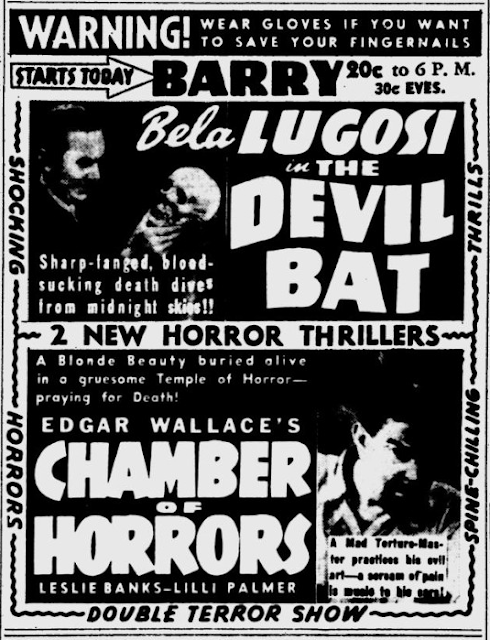 |
| Bela Lugosi's "The Devil Bat" advertisement in the Pittsburgh Post-Gazette, January 29, 1941. |
January 1941
January 1, 1941: Muselier ArrestedJanuary 2, 1941: Camp Categories
January 3, 1941: Liberty Ships
January 4, 1941: Aussies Take Bardia
January 5, 1941: Amy Johnson Perishes
January 6, 1941: Four Freedoms
January 7, 1941: Pearl Harbor Plans
January 8, 1941: Billions For Defense
January 9, 1941: Lancasters
January 10, 1941: Malta Convoy Devastation
January 11, 1941: Murzuk Raid
January 12, 1941: Operation Rhubarb
January 13, 1941: Plymouth Blitzed
January 14, 1941: V for Victory
January 15, 1941: Haile Selassie Returns
January 16, 1941: Illustrious Blitz
January 17, 1941: Koh Chang Battle
January 18, 1941: Luftwaffe Pounds Malta
January 19, 1941: East African Campaign Begins
January 20, 1941: Roosevelt 3rd Term
January 21, 1941: Attack on Tobruk
January 22, 1941: Tobruk Falls
January 23, 1941: Pogrom in Bucharest
January 24, 1941: Tank Battle in Libya
January 25, 1941: Panjiayu Tragedy
January 26, 1941: Churchill Working Hard
January 27, 1941: Grew's Warning
January 28, 1941: Ho Chi Minh Returns
January 29, 1941: US Military Parley With Great Britain
January 30, 1941: Derna Taken
January 31, 1941: LRDG Battered
2020


